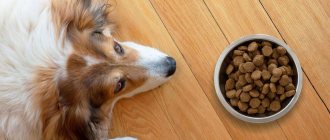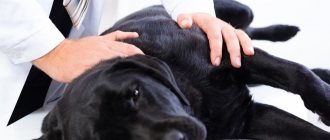The digestion process is complex and consists of several main and intermediate stages. A failure at a certain stage will lead to problems for subsequent ones, resulting in disruption of the entire digestive system.
So that your pet does not suffer from various types of problems related to food intake, and you do not rush from article to article in search of a solution, we have collected and structured all the necessary information in one place.
Time it takes for food to enter the stomach
It is difficult to give an unambiguous answer to the question of how long it takes for food to pass into the intestines and be digested. Let's divide it into subparagraphs:
Volume
The more you eat at one time, the longer it will take to digest. This is due to the ratio of the amount of food and the volume of secretion of gastric juice, bile, and digestive enzymes. Moreover, a large volume of food puts pressure on the walls of the stomach, which leads to increased blood pressure.
Nutrient type and consistency
- Carbohydrates , foods of plant origin, cereals, etc., take longer to digest, since the length of the intestines in dogs, its microflora and the composition of enzymes are more suitable for quickly digesting foods of animal origin.
- Squirrels . Digested much faster than any other nutrients. Their digestibility depends on the fat content of the meat; leaner meat is digested and absorbed more easily than pork and lamb.
- Fats . Absorbed a little faster than proteins. The dog's body digests only animal fats, while vegetable fats are excreted in urine and feces. In other words, the more carbohydrates in a meal and the less fat and protein, the more food will be digested.
Liquid food , such as cereals, soups, broths, will be digested faster, since it has already been partially “digested” by the heat treatment process.
Activity
If your dog is fidgety, constantly on the move, and does not sit still, then he will digest food faster because he has an increased metabolic rate, as well as an increased need for these same substances.
Diseases and failures
If there is a problem with the digestive system, external signs (vomiting, expectoration, bloating) may not appear , but internal signs (bloating, constipation, dysbacteriosis) may be present and slow down the digestion of food.
Frequent belching in dogs
Regular belching indicates a violation of the digestive mechanisms, especially if it occurs some time after feeding.
Possible causes of increased gas formation and frequent belching include:
- congenital or acquired reflux disease caused by insufficient closure of the esophageal sphincter, as a result of which gastric juice damages its lower sections;
- systematic violations of the eating schedule or diet;
- involuntary contractions of the mucous membrane during gastritis or peptic ulcer;
- protrusion of the wall of the esophagus, up to perforation;
- helminth infestation;
- disturbances in the functioning of the pancreas, liver or gall bladder, which are accompanied by increased acidity;
- intestinal obstruction, which produces hydrogen sulfide and ammonia gases, and belching becomes foul-smelling;
- prolonged stress and concomitant stomach neurosis;
- pathologies of the development of the digestive system, internal injuries or diaphragmatic hernia;
- in rare cases of heart disease.
In addition to belching, due to pathologies of the digestive system, your pet may experience the following symptoms:
- increased appetite , or, conversely, its complete absence;
- diarrhea or difficulty defecating , up to prolonged constipation;
- the animal burps mucus and foam
- flatulence, bloating, rumbling;
- increased salivation, nausea, the dog vomits repeatedly;
- change in body temperature;
- general weakness , decreased activity and depressed state of the pet.
If one or more pathological symptoms appear, you should immediately contact a veterinary clinic and diagnose the animal’s condition.
Differences in the causes of vomiting and regurgitation
Vomiting is a mechanism of emergency emptying of the stomach through spasm of smooth muscles. This process is provided by nature in case a toxic or foreign substance enters the stomach.
REFERENCE! The peripheral immune system of the stomach detects harmful microorganisms and eliminates them in this way, and also enters them into a “registry” so that when they subsequently enter the body, they are eliminated before they enter the stomach.
If a dog vomits after eating regular undigested food that does not contain toxic components, this indicates that the immune system has failed and the intestinal microflora perceives all elements as foreign. You need to contact a veterinarian.
Regurgitation is a reflex process that starts when:
- Getting food or liquid into the windpipe;
- Swallowing hard, too dry, powdery foods;
- When the piece became across the throat;
- When a pet has eaten too much, the stomach swells and gases, which are released during the processing of food by enzymes, leave the stomach through the esophagus;
- If the dog was hungry and attacked the plate, swallowing it in a matter of minutes, it swallowed air, which entered the stomach in large quantities, and now it comes out along with food particles, causing belching.
If a dog burps, then there is nothing dangerous , it is just part of the animal's meal.
Why does this happen immediately after the dog has eaten?
If your pet has not previously experienced bouts of vomiting after eating, then there is no need to worry - most likely, it was provoked by one of these factors :
- Eating grass. All green plants are poorly digested and release a substance that irritates the intestinal walls.
- Binge eating. The volume of food is too large and it literally rises to the throat.
- Pregnancy or breastfeeding . Toxicosis is observed quite often in lactating and pregnant mammals and is caused by hormonal changes.
- Motion sickness on the road. Like people, dogs are also susceptible to motion sickness and “sea sickness,” which affects the vestibular system, which sends out random, chaotic signals, confusing the nervous system.
- Haste while eating. Food arrives faster than gastric juice is released, which is why it is rejected by the stomach when it touches its bare walls.
- The dog choked or choked after swallowing a large or rough piece of food.
- Active behavior after eating. If after a meal the pet goes for a walk, swim, or play, the food in the stomach will succumb to vibrations and shaking, which will slow down or stop the digestion process.
- Heatstroke. Overheating increases blood pressure, as a result of which organ tissues are supplied with blood worse and work more slowly.
- If you have a male who senses a female and is eager to go outside, he will experience a loss of appetite. If you still managed to feed him by deception (for example, adding his favorite treat to his food), he will vomit, since all systems are configured for mating, and not for digesting food.
What to do if you feel sick every time?
If vomiting accompanies every meal, the reasons may be the following :
- incorrectly selected food;
- gastrointestinal diseases;
- there is still undigested food in the intestines;
- foreign object in the stomach or intestines;
- allergies to certain foods;
- taking vitamins or medications.
Feed ingredients that cause nausea
- First of all, synthetic filler . Pay attention to the first element in the feed. According to standards, ingredients are arranged in descending order by weight. If soy comes first, this is the most abundant component in the feed. Good fillers are cereals, corn fiber, poultry bone meal. Cheap food uses “plant by-products” - this is a low-quality base that can cause nausea.
- Flavor enhancers. Sometimes they are added to feed and canned meat. A classic example is monosodium glutamate, which causes irritation of the gastric mucosa.
- Ash. These are all inorganic elements (mineralized structures and vitamins) with which the feed is enriched. If their proportion in the food is too large, the stomach will reject them, just like a coin or stone that a dog might accidentally swallow.
How to choose a quality one?
- Pay attention to the price category and class . So-called premium food is not a treat for every day, so the price is quite high.
- Manufacturer. Trust trusted companies, test new brands with caution.
- Study the composition based on the instructions above.
- If your pet is growing up, neutered, active, or aged, choose food with the appropriate name .
Symptoms accompanying cough
Coughing in dogs is not usually the only symptom; other signs of developing diseases may also be seen. Pay attention to these accompanying signs
:
- does the dog have nasal discharge?
- redness of the conjunctiva of the eyes or discharge from them;
- whether foam comes out of the mouth when coughing;
- whether the dog is losing appetite and weight;
- whether she became lethargic and depressed;
- whether cough, shortness of breath and wheezing appear when breathing after physical activity;
- Is the dog sneezing?
- how often she breathes at rest;
- Is there any coughing or vomiting?
These observations will later help the veterinarian clarify the diagnosis, since, we repeat, there are quite a few reasons for the occurrence of this symptom.
How can you tell if you are vomiting undigested food?
Symptoms that indicate that food is not digested :
- You can see the original products in the vomit.
- After vomiting, the dog may start eating it, or go to the bowl because it is still hungry.
- Breathing quickens, hypoxia occurs (lack of oxygen in tissues) , because all the blood rushes to the stomach to eliminate the problem.
- Decreased body temperature, cold sweat.
- The dog may begin to whine or whine.
- "Glass Eyes"
- Increased salivation.
ATTENTION! If you find blood in your vomit, this may indicate inflammatory processes in the digestive organs, damage to the walls of the stomach, or internal bleeding. It is recommended to consult a doctor immediately.
Treatment of acute pancreatitis
In mild cases of pancreatitis, the disease can be treated at home, with regular monitoring by a specialist. For more severe forms of the disease, treatment must necessarily take place in a hospital. The main goal of treatment is to restore impaired pancreatic function and prevent complications.
Drug therapy for acute pancreatitis may include the following medications:
- analgesics;
- myotropic antispasmodics;
- antibiotics to prevent secondary infection.
If the disease has reached a critical level, and conservative therapy does not help, specialists can resort to laparotomy - a surgical method during which the doctor gains access to the damaged organ.
Only a doctor can determine the correct treatment regimen for acute pancreatitis and help eliminate the symptoms. It is very important not to delay visiting a doctor when the first signs of the disease appear: the very first attack of inflammation of the pancreas can result in the disease becoming chronic.
What to do if the attack does not stop?
In a situation where the dog’s gastrointestinal tract has eliminated the entire volume of food, and vomiting continues, give it water to rinse its stomach. Possible reasons:
- Most likely, some of the food remaining on the “bell” irritates it, causing a vomiting reflex.
- Violation of the water-salt balance , and as a result, loss of fluid caused a spasmodic chain reaction. In other words – convulsions. The dog should be wrapped in a warm towel in the stomach area or a heating pad should be placed.
- Extremely severe poisoning , during which the enzymatic composition of gastric juice shifted to the “protective stage”. This happens after poisoning.
Do not try to stop the vomiting, but visit a veterinarian. Until the time of the visit, do not feed your pet or give water, as it may also be perceived as poison. The veterinarian will diagnose and prescribe a course of treatment.
Possible complications
Regurgitation in itself does not pose a risk to your pet's health. But in case of frequent and profuse vomiting, the body loses water and does not receive nutrients from food. Therefore, the main consequences for the dog can be anemia and dehydration. If there are foreign bodies in the digestive tract, bleeding may occur.
Other specific complications may develop as a result of chronic problems with internal organs.











